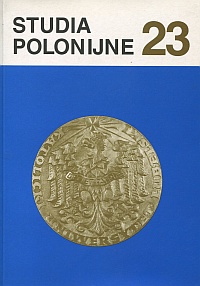The Participation of Polish Emigrants in Political and Economical Life of Modern Greece (1821-1918)
Main Article Content
Abstract
The paper sought to present the number of Poles and their participation in the political and economical life of modern Greece. The chronological frameworks of the publication range from the outbreak of Greek rising for independence in 1821 (when Greece remained under Turkish domination) to the end of the First World War in 1918. The main question posed here is to determine the reason why Polish emigrants were in Greece, what they did there and what role they played in this country in the nineteenth century and in the beginning of the twentieth century. As regards bibliographical sources, they constitute archival data, memoirs, and the press published in Poland under partition. In addition, the paper is based on literature about the migration of Poles to Athens and other places.
The history of the Greek nation in the nineteenth century was in a way similar to the history of the Polish state. Both nations attached much importance to the struggle for national independence. Greece, however, gained independence earlier than Poland, but in the nineteenth and twentieth centuries it fought for independence in all territories which ethnically belonged to Greece. Therefore Poles participated in all political events important for the Greek state in the years 1821-1918. They arrived in Greece after the fall of the 1848 rising in Europe and fought in the Greek rising. They acted at the Turkish-Greek border after the end of the Crimean war and sided with Greeks in their struggle against Turkey, their everlasting enemy.
Poles took part in the modern life of Greece, both individually and collectively. This fact has decided about the layout of the paper divided into two parts. The first part shows the collective contribution of Polish emigrants to the political life of Greece, and the second part is about the individual attitudes that Poles adopted in politics and economics there.
One can divide the history of Polish migration till the twentieth century into several stages. The first one consisted of emigration from the pre-partition period; the second one is political migration in the name of independence; the third one is mass labour migration, which started in Polish territories in the second half of the nineteenth century. The first and the last form was not practically reflected in this part of the Balkans. Therefore the majority of people who arrived in Greece in the period under discussion constituted political emigration. Despite a small group of Polish migrants settled at the bottom of Acropolis in the nineteenth and at the beginning of the twentieth centuries, a few of them were satisfied in their career and obtained high ranks in the army and administration. A reflection of Polish migration to Greece in that period was kinship between Andreas Papandreu, several times prime minister of contemporary Greece, and Zygmunt Mineyko whose descendants have lived until today in Poland and Greece.

